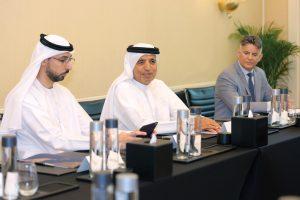DUBAI / WAM
The Dubai Supreme Council of Energy (DSCE) organised a workshop to highlight key projects and sustainable energy systems that support the UAE Net Zero by 2050 strategic initiative, the Dubai Clean Energy Strategy 2050 and the Dubai Net Zero Carbon Emissions Strategy 2050.
Representatives from the DSCE, the Executive Council, the Carbon Abatement Committee, and the C40 Cities Climate Leadership Group, discussed the positive effects of implementing projects and programmes that helped achieve a 21 percent reduction in carbon emissions in 2021 and 22 percent in 2022. The workshop supports preparations to host the 28th Conference of the Parties (COP28).
The C40 delegates praised Dubai’s pioneering role in implementing major and unique projects within a short time, adopting the latest technologies, and creating a solid investment environment for clean energy projects under clear government policies and legislation to support the green economy development roadmap.
Ahmed Buti Al Muhairbi, Secretary-General of the DSCE, said, “Guided by the vision of its wise leadership, Dubai has implemented major quality projects and launched pioneering initiatives to diversify clean energy sources. These included all clean and renewable energy technologies in Dubai, such as photovoltaic solar panels, concentrated solar power, green hydrogen generation using solar power, pumped-storage hydroelectric power plant in Hatta using clean energy, and thermal energy storage.â€
“Dubai has also increased the number of hybrid and electric vehicles. These efforts support sustainable development to reduce the carbon footprint across all activities in the emirate. Through the Independent Power and Water Producer (IPWP) model, Dubai enhances the participation of the private sector in project implementation. The model has attracted global and local investments, establishing Dubai’s position as a global hub for green economy and future technologies.â€
Taher Diab, Senior Advisor, Strategy and Planning at the DSCE, said, “The unique, sustainable energy system in Dubai, which is led by the ongoing efforts of Dubai Electricity and Water Authority, the Roads and Transport Authority, Dubai Municipality, ENOC, Dubal Holding, and Dubai Petroleum Corporation, has been implemented since 2015. It focuses on the effective policies, governance mechanisms, monitoring goals and indicators, and budgets to reduce carbon dioxide emissions annually to reach Net-Zero by 2050.â€
 The Gulf Time Newspaper One of the finest business newspapers in the UAE brought to you by our professional writers and editors.
The Gulf Time Newspaper One of the finest business newspapers in the UAE brought to you by our professional writers and editors.
